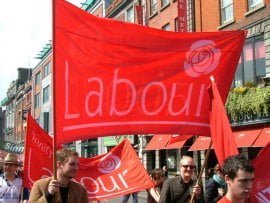We publish here a letter from a Socialist Appeal supporter about his experiences of a recent local Labour Party meeting, which reflects the beginnings of a mood change within the Party. As the Coalition’s cuts take effect, and with the Labour leaders failing to provide a fighting, socialist alternative, many ordinary Party members are beginning to raise the voices in concern and demand a genuine opposition to austerity.
We publish here a letter from a Socialist Appeal supporter about his experiences of a recent local Labour Party meeting, which reflects the beginnings of a mood change within the Party. As the Coalition’s cuts take effect, and with the Labour leaders failing to provide a fighting, socialist alternative, many ordinary Party members are beginning to raise the voices in concern and demand a genuine opposition to austerity.
From my experience, my local Constituency Labour Party (CLP) usually has the same meeting structure. There is a discussion about a topical issue for about an hour (this can include bigotry in football, health and fitness etc.) followed by a parliamentary report from an MP or MSP for about half an hour, a financial report for about 15 minutes, and then a quick skim over “Any Other Business” (AOB), before ending as soon as possible. This structure means there’s less opportunity for members to voice any awkward political issues or problems they have with the party’s leadership or programme.
Of course there are opportunities for rank and file members to speak after the talks in an “Any Questions or Points” format. This pressures members to talk about the discussed issues rather than what may have been their first choice of topic. Any deviation is frowned upon. Why bring up bedroom tax or rising unemployment when the discussion is clearly about bigotry in football?
The majority of the time this tactic works; but obviously when the class struggle is intensifying – like it very much is just now – and when, at the same time, the Party leadership are exposing themselves by such acts as not guaranteeing that they would repeal the bedroom tax or their terrible handling of the Unite / Falkirk CLP selection process issue, they find it more and more difficult to suppress the anger of rank and file LP members.
In a recent meeting at my CLP, Patricia Ferguson MSP (Glasgow Maryhill), Shadow Secretary for Culture and External Affairs talked about the importance of art and sport in the communities and including in her discussion the Commonwealth Games. At “Any Questions” I contributed to the discussion and made the point that the sustenance and progression of art and also sports is to be found in society and that it’s necessary for everyone to have access to contribute to and participate in these activities. Because of this, economic issues cannot be ignored. At the moment, many people are too poor to participate or they work so long that they don’t have time to participate, and that these barriers to participation, with upcoming cuts, are going to get worse and will lead to a serious degradation in these activities that she [Ferguson] is very passionate about. I finished my contribution by asking her how she was going to tackle this.
Ferguson responded with “I’m glad you asked that”, then assured me and the rest of the CLP that many of those who complain about not having money to spend on Olympics tickets or arts festival tickets are the same people who spend £80 on a Robbie Williams concert. This did not go down well. I did not get a chance to respond, but I did not need to. After my intervention many more intervened asking her how she’s going to tackle the poverty in the area mentioning that many of their family members can barely afford to get by, never mind participate in sports and arts activities. Somebody used the the “any questions” to ask about the bedroom tax, saying that he “could not, as a Labour man, go out and campaign for the Party when they weren’t even going to reppeal this”. Ferguson said “this is a wee bit out of my comfort zone”, followed by an awkward laugh, then tried to brush the subject off. Again, other members weren’t impressed. It was clear that her audience was tougher than she expected. She did not take part in any more of the meeting and left straight after her talk.
The parliamentary report also ended with some irate interventions about the Better Together Campaign [the official anti-independence campaign being run by the LP in Scotland](which was described by a member as using Labour campaigners to dish out Tory Propaganda), although this was a recurring issue for this CLP.
Importantly there were trade union representatives who either were not regular attendees or who were attending for the first time, and who felt the need to go along. One raised an issue about how the party had handled the distribution of their union’s literature. All these issues were in the intervention time and many were not related to the topic in question. AOB was skipped over so quickly that most members didn’t notice, but I managed to bring up the topic of the Labour-union link and the Falkirk incident. I was advised that this will be discussed soon after Ed Miliband makes his statement in March. From the response I got from the rest of the meeting, this topic was clearly something that many others also wanted to discuss.
In periods of ebb in the class struggle, the Labour Party – without the pressure of large amounts of active working class people – is inevitably left to careerists and bureaucrats. This can understandably make it very off putting to layers of left-wing activists who are around during such periods of relative class peace, or when the struggle is beginning to heighten but the tops of the labour movement still have a hold. However we ardently challenge the view held by many ultra-left tendencies that the Labour Party bureaucracy is an eternally unbeatable powerful force. One meeting with several angrier than usual members was enough to weaken the usual bureaucratic dampening techniques used to dampen discussion and expose the leaders for their complete weaknesses (and in some cases shear class snobbery).
If people are angry enough, they will not be held back by routine meeting structures. They will use every available opportunity to voice their issues, whether it’s related to the discussion or not. This was just the begining. As the cuts take effect, CLPs can expect visits from more and more angry members. Despite what our comrades who’ve given up on the Labour Party – many of whom seem to have unfortunately given up on the working classes also – say, this bureaucracy will not last in its current form forever. The Labour Party is not finished by a long shot, and in the near future the internal structures of the Party will be the battle ground for some very important class battles.
Ross Walker, Cunninghame North CLP






